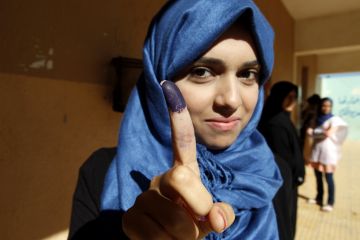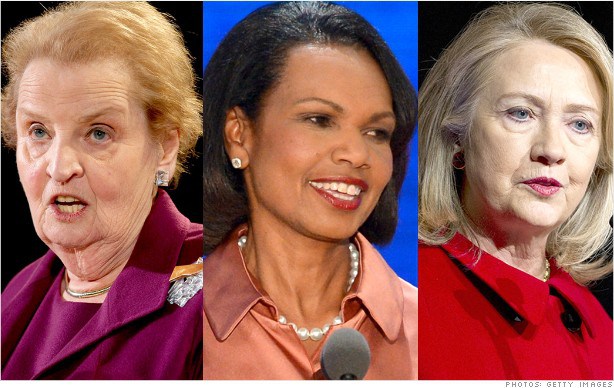Women in Libya are at an important crossroads. They have emerged from the repressive Gaddafi era with renewed representation in the Libyan political sphere. There is no guarantee, however, that gains made since the NATO intervention in 2011 will endure. As such, women in Libya must take an active role in ensuring that they are well-represented in the drafting of the country’s new constitution.
Muammar Gaddafi’s time as ruler in Libya was characterized by deep political repression. In 2011, Freedom House included the country on its list of the ten most repressive societies in the world. It received the lowest possible ratings in the categories of political rights and civil liberties largely because of the violent crackdowns the regime was conducting on anti-government protestors at the time. Even during relatively peaceful times, state control over daily life was pervasive and the core components of a robust democracy – a constitution, an independent press, and political parties – had been banned for over 35 years.
Neither men nor women enjoyed substantial political or civic rights during Gaddafi’s reign, however, women suffered disproportionately because of the staunch application of Sharia law and the perpetuation of discriminatory social norms in areas such as marriage, divorce, and inheritance. For example, Libya’s penal code institutionalized gender-based violence by granting women unequal personal status in laws related to family relations. Women had no legal recourse for issues of domestic violence or sexual assault. A primary barrier to women’s rights (and overall human rights) in Libya was the fact that many laws and regulations existed only on paper and were often manipulated to enable the continued rule of Gaddafi or lacked enforcement mechanisms such that they did not exist in practice.
As the Arab Spring took hold throughout the region, anti-government protests began in Libya in February 2011. The Gaddafi regime responded with severe military crackdowns on the protestors which prompted swift condemnation from the United Nations Security Council. Resolutions 1970 and 1973 provided the basis for NATO intervention Operation Unified Protector, which began on March 23, 2011 with the establishment of an arms embargo. This was soon followed by a no-fly zone and a direct military intervention to protect civilians on March 31, 2011.
The NATO operation in Libya ended on October 31, 2011 after the capture and death of Gaddafi. Since the end of the conflict, Libya has faced the challenge of transitioning into a responsible, stable government. The first democratic national elections in the country were held on July 2012. This election was especially meaningful for Libyan women as women’s groups lobbied hard for an election law that would facilitate their political participation. As a consequence, 33 women were elected to the new parliament and a caucus was established to promote women’s rights during the country’s precarious transition.
[captionpix align=”left” theme=”elegant” width=”320″ imgsrc=”http://www.libyaherald.com/wp-content/uploads/2012/12/64-VLW-other-womens-groups-meet-Magarief-271212.jpg” captiontext=”Women’s rights advocates meet with General National Congress head Mohamed Magarief who has expressed support for their inclusion in the constitution drafting process.”]
This historic election was an important step forward for women’s rights in Libya but recent developments demonstrate that gender-based discrimination is deeply rooted in Libyan society. The Grand Mufti of Libya called for the application of Sharia law and has specifically promoted strict gender segregation in all workplaces, classrooms, and government offices. Such rhetoric is evidence that while Libya has seen progress with respect to women’s rights, there is still much work to be done.
Women’s rights advocates in Libya have thus reached a crossroads. The country is preparing for another national election in which a Constituent Assembly will be elected and will be charged with drafting the new constitution. The United Nations has called for women to be active in this process to ensure that their voices and their rights are fairly represented in this seminal document. As Human Rights Watch commented, the stakes could not be higher for Libyan women as the opportunity to contribute to the constitution provides a “once-in-a-lifetime opportunity for Libyans to lay the legal foundations of their reformed state.” It offers women the chance to establish their rights and take concrete steps toward the eradication of gender-based discrimination. In the past, the fact that laws were rarely upheld in practice was a severe detriment to women’s rights. This can change if women are empowered to have a greater voice in the political and social development of their country. Human Rights Watch identifies four priorities that must be addressed to help secure rights for women in this new era in Libyan history. These priorities include, equal participation in the Constituent Assembly between men and women, explicit references to gender equality in the text of the new constitution, repeal of or amendment to Gaddafi-era laws that grant unequal status to women, and end of discrimination against women in public and political life as well as end of impunity for domestic violence.
Overcoming decades worth of women’s rights abuses is a necessary but daunting undertaking. Women in Libya have the enormous responsibility of making their voices heard and asserting their rights in the new constitution. If successful this would be a crucial victory for Libya and women everywhere, but it is still just the beginning. The deep societal roots of discrimination will not disappear with the signing of a new constitution no matter how comprehensive the language is. Having women participate in drafting the new constitution is a crucial step toward gender equality in Libya, but addressing entrenched societal norms is a process that could take generations to realize. All Libyan citizens must work toward reversing the powerful trend of gender-based discrimination and use this new constitution as a catalyst toward a reformed future. As challenging as this task may be, it is an opportunity they cannot afford to miss.




